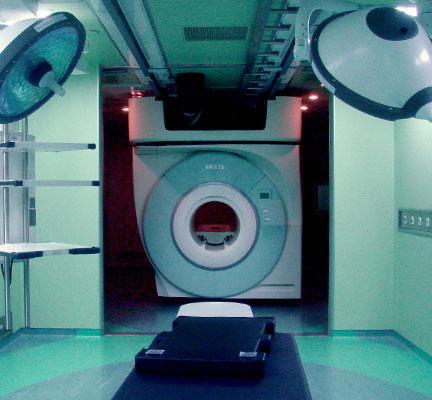
The Imris Visius iMRI at Huashan Hospital in Shanghai, China, provides neurosurgeons high-quality MR images during surgery which results in more complete brain tumor removal in patients. (CNW Group/Imris Inc.)
September 19, 2014 — Imris Inc. announced that a recently published article in the journal Neurosurgery is the highest-level clinical evidence to show that the use of Visius intraoperative magnetic resonance imaging (iMRI) in brain tumor surgery results in complete tumor removal in more patients with glioma tumors.
Led by Dr. Jin-song Wu, the neurosurgical team at Huashan Hospital at Fudan University in Shanghai, China, conducted the study and wrote the interim analysis article that was published in August. Wu and the clinical team were honored with the Journal of Neuro-Oncology Award at the Congress of Neurological Surgeons (CNS) Annual Meeting in October 2013 for their study design and abstract.
The prospective, parallel, randomized, triple-blind controlled trial design provides the most objective data and therefore highest level evidence to date of the value of iMRI in treating both low and high-grade gliomas. The early results reinforce that high-field iMRI-guided surgery is more effective in achieving complete resection than conventional neuronavigation-guided surgery. Other published studies on high-field iMRI have been mainly retrospective.
"iMRI is a practical and valuable asset to increasing the extent of resection for cerebral gliomas, with a specific significant influence for low grade gliomas," Wu said. "With trends to statistical significance, these early results are the highest level of iMRI evidence for glioma surgery now available. This leads to more improved overall survivability and quality of life than using conventional neuronavigation."
The low-grade glioma (LGG) subgroup patients who were treated in a Visius Surgical Theatre using iMRI had a statistically significant complete resection rate of 82 percent compared to 43 percent for the control group of conventional surgery patients. For the high-grade glioma (HGG) patients, 91 percent of those treated with iMRI had complete resection compared to 73 percent for the control group. These results are confirmed by volumetric analysis. The LGG subgroup met the endpoint early and that arm of the study stopped enrolling additional patients. The study continues for HGG patients.
The Imris Visius Surgical Theatre with iMRI at Huashan Hospital provides neurosurgeons high-quality MR images during surgery to see the area of the brain they are operating on in exquisite detail, see tumor size and shape, and distinguish between healthy and unhealthy tissue more easily. The surgeon can take images before completing the surgery and check if additional tumor or abnormal tissue removal is needed to reduce risk of re-operation.
Unlike other iMRI systems, the Imris scanner moves between two adjoining rooms - one intended for surgery and the other for diagnostic scanning - on ceiling-mounted rails to the patient so the surgical team can maintain optimal surgical positioning, access and techniques without moving the patient.
One of five Visius Surgical Theatre installations in China, more than 1,000 patient procedures have been completed using the Fudan University iMRI since its installation in Sept. 2010.
For more information: journals.lww.com/neurosurgery/Citation/2014/08001/3_0_T_Intraoperative_Magnetic_Resonance.31.aspx.


 February 13, 2026
February 13, 2026 









